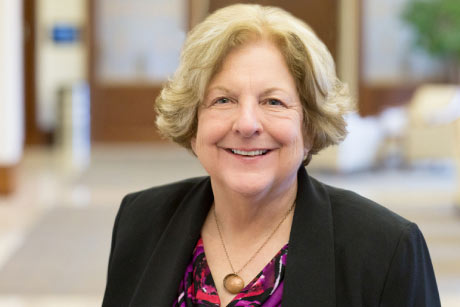Bringing Economic Education to the Masses

Mary Suiter, Assistant Vice President and Economic Education Officer
For Mary Suiter, learning about economics isn’t something that should start in college or even in high school. Instead, she believes this education should begin as early as pre-kindergarten.
Why so early? Suiter, assistant vice president and economic education officer at the Federal Reserve Bank of St. Louis, pointed out research from England shows children begin to develop financial habits as early as 7 years old.
“So, if we want them to make better decisions about saving and spending, we have to intervene earlier and teach them about making careful decisions with their money, careful decisions about their education, careful decisions about their lives,” she said. “We want to start that early and build on it.”
And economics teaches skills and tools about making decisions and cost-benefit analysis that can be beneficial to anyone, she noted.
This passion about economic education spans more than three decades. She currently leads a talented team of educators who develop award-winning educational resources for use with pre-K through adult audiences and provide professional development for educators.
In a Women in Economics Podcast Series episode, Suiter discussed the value of economics, her work teaching economics to Russian teachers after the fall of the Berlin Wall, the importance of networking and her work with the St. Louis Fed’s Women in Economics Symposium and the Women in Economics Podcast Series. (The episode includes a transcript of the interview.)
Learning about economics is something that Suiter wished had happened earlier in her own life. She started her undergraduate studies as a ceramic engineer at the University of Missouri-Rolla (now known as the Missouri University of Science and Technology). After her husband got a job in St. Louis, she transferred to the University of Missouri-St. Louis (UMSL), where she took a microeconomics class.
“It was as though a light bulb went off; I wondered why no one had ever told me about economics before, no one had ever explained these things to me,” said Suiter, who earned a bachelor’s degree in economics from UMSL. She would later earn a master’s degree in economic education from the University of Delaware and a doctorate in curriculum and instruction from UMSL.
Citation
ldquoBringing Economic Education to the Masses,rdquo St. Louis Fed On the Economy, Nov. 2, 2021.
This blog offers commentary, analysis and data from our economists and experts. Views expressed are not necessarily those of the St. Louis Fed or Federal Reserve System.
Email Us
All other blog-related questions

